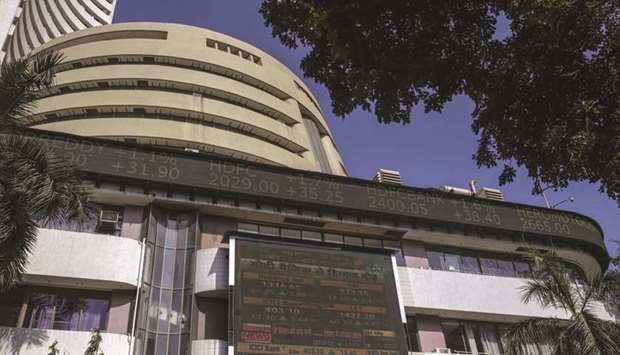Indian stocks rebounded in a volatile session, following a record fall on Monday triggered by a nationwide lockdown.
The S&P BSE Sensex Index closed up 2.7% at 26,674.03 points yesterday, after advancing as much as 5.7%, with the NSE Nifty 50 Index rising 2.5% for the day. Finance Minister Nirmala Sitharaman’s speech in the last hour of trading failed to excite investors due to a lack of relief measures for the economy amid the pandemic. Investors will now turn their attention to the prime minister’s speech.
Swings on India’s benchmark stock gauge spiked to a record high yesterday, with Sensex’s 10-day realised volatility hitting a record 106%. Average trading volumes for the Sensex were about 46% more than the 30-day average at the close.
Prime Minister Narendra Modi and state leaders over the weekend imposed an almost complete lockdown, which will probably worsen an economy already growing at its slowest pace in more than a decade. India has 468 virus cases so far, including nine deaths. But experts say the country could be on the same trajectory as Italy, where the outbreak quickly escalated, causing hospitals to overflow.
Oxford Economics has slashed India’s growth forecast for January to April to 3%, a number not seen even during the worst of the global financial crisis, even as the government weighs the possibility of a fiscal stimulus to support the economy. Meanwhile, the central bank last week announced measures to boost liquidity while holding back from following global peers with a rate cut.
In an effort to support the domestic market, the Securities and Exchange Board of India has lowered the compliance burden on market participants, including extending risk management framework deadlines for mutual funds. The regulator last week raised margin requirements and capped derivatives exposure for a month in a bid to subdue market volatility.
Foreign investors have sold $6.7bn worth of Indian equities in March, on track for a record monthly withdrawal, according to data compiled by Bloomberg dating back to 1999.
“It’s a great time to pick up bargains in markets like India,” Mark Mobius, co-founder and partner at Mobius Capital Partners LLP, said in an interview with Bloomberg Television. “Many companies around the world, not only in India, are not going to be harmed that much by what is happening now.”
“Everyone is waiting for stability in stock prices,” said Deven Choksey, who oversees investment and research as managing director at KR Choksey Securities in Mumbai. “Market players are not participating as per normal.”
Fifteen of the 19 sector sub-indexes compiled by BSE Ltd advanced, led by a gauge of IT stocks. Infosys Ltd rose the most on the Sensex index, up 12%, and was the biggest boost to the benchmark.
Meanwhile the rupee yesterday gained against the US dollar amid a broad weakening of the greenback after US Federal Reserve announced another round of stimulus measures to cushion the impact of coronavirus on American economy.
Other Asian currencies were also higher against the US dollar yesterday. The rupee rose to 75.93 per US dollar at day’s high, as compared to previous close of 76.29. The rupee had hit a record low of 76.32 against the US dollar in the previous session.
Paring some early gains, the rupee settled higher at 76.10 per dollar. Indian stocks markets also failed to sustain early gains and the Sensex ended nearly 700 points higher.
In global markets, the US dollar slipped after the Fed announced unlimited quantitative easing and programmes to support credit markets, pulling out all stops to supply much needed greenback liquidity.
The dollar index lost about 0.8% to 101.67, slipping further from Friday’s peak of 102.99, its highest level since January 2017.
Year to date, the US dollar has gained about 7% against the rupee, with much of the rupee’s fall seen this month as foreign investors dumped emerging market assets.
Some analysts expect the volatility in forex markets to continue.
There is complete uncertainty with respect to when normalcy would be restored and what kind of damage it would do to the global economy until then, says Abhishek Goenka, Founder & CEO, IFA Global. “This uncertainty has triggered a flight to safety,” he added.

An electronic ticker board indicates latest figures for the Sensex at the Bombay Stock Exchange building in Mumbai. The Sensex closed up 2.7% to 26,674.03 points yesterday, after advancing as much as 5.7%.
